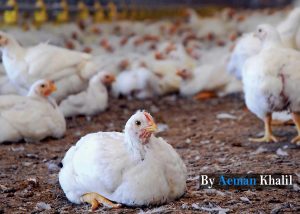
Karachi: Outbreaks of lumpy skin disease (LSD), a viral skin disease that is caused by elevated nodules on the skin. This disease is caused by a debilitating virus in farm animals and has pushed up meat prices throughout the country.
Lumpy skin disease has had an impact on sales and production in every province. The disease had rapidly spread through Sindh and KPK and had now reached Punjab. LSD is thought to be spread by flies or mosquitoes, causing lesions on the skin and other symptoms such as significantly reduced milk production. It is often fatal. Moreover, the meat and milk from these animals are not safe to consume.
In Sindh, the number of registered animals infected with LSD has risen to 53,393, with 571 cattle dying. At the moment, the province’s total number of infected animals exceeds 5,363, with 47,459 cattle recovering after successful treatment. In total, over 2.7 million cattle in the province have been fully vaccinated against the Lumpy Skin virus. However, farmers’ refusal to have their animals vaccinated also played a significant role in the spread. Dr. Nazeer Hussain Kalhoro, the director general of Sindh’s livestock department and the head of the provincial task force on Lumpy Skin disease criticized high meat prices on a scarcity of investment in the sector by insufficient public and private sector investment.
According to farmers and provincial livestock department officials of Punjab, the Lumpy’s skin disease entered Punjab from Sindh. Even though the disease affects cattle, calves are losing monetary value due to fear. So far, 29,620 cases have been reported among the 14.6 million cattle population, giving rise to 765 deaths and 21,720 recoveries. Punjab seems to have two support and reassurance: the actual rate of spread is slow, and the LSD does not move to humans. However, the numbers have now stabilized because the province has vaccinated 15% of the livestock population.
Balochistan has also been equally affected. Abdul Samad, president of a provincial beef sellers’ association, confirms that the sales have dropped by more than 40% since LSD spread, as the disease has terrified away potential customers leading to trust issues with the meat provided by the shopkeepers. Up to this point, 20,000 animals have been vaccinated, approximately, in the entire province. The exports have declined significantly by up to 40% to 50%.
Khyber Pakhtunkhwa has reported 46,343 LSD cases, culminating in 2,366 deaths accounting for a whopping 5% of total infections. The disease’s effect on the current financial losses has been estimated at Rs. 2 billion. Dr Alamzeb, director general of the KP livestock department, estimates an Rs. 50 billion annual loss if the situation is not handled properly by vaccinating the cattle.
Pakistan is an agriculture-based economy, with a large portion of its economy based on livestock and dairy farming. LSD has an impact on both of these industries, as well as associated sectors such as leather export. Without any checks and balances on the spread of this disease, a significant number of individuals involved in these businesses may face great hardship. Aside from LSD, devastating floods have killed hundreds of thousands of animals. A livestock shortage is expected in the coming days, impacting meat supply and resulting in higher prices.
By. Ayesha Farrukh







